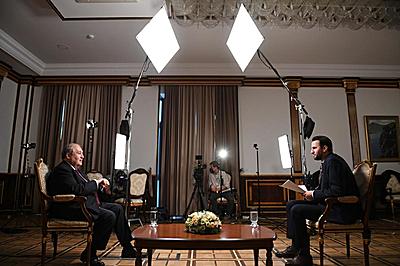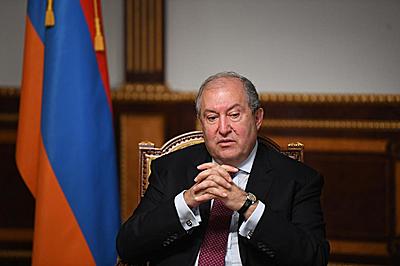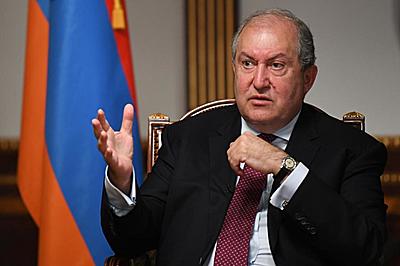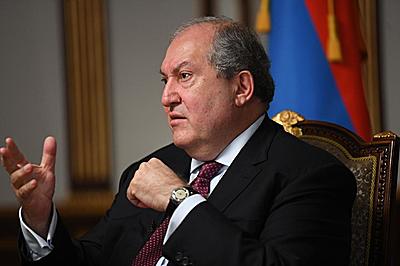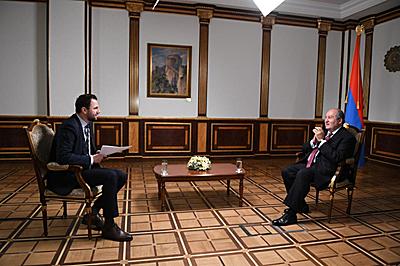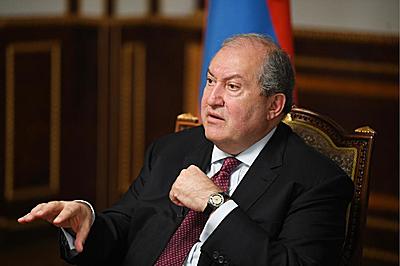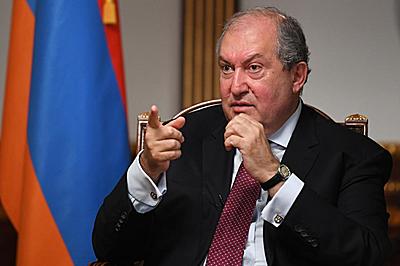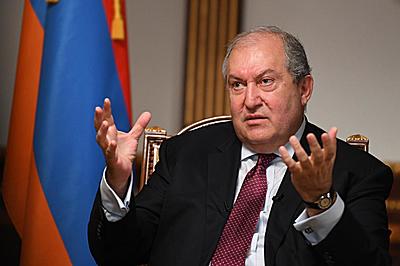Interviews and press conferences
Trust and friendship is something to be taken care of every day: President Armen Sarkissian’s interview to RT station
President Armen Sarkissian gave an exclusive interview to RT TV station.
Question: Mr. President, good afternoon. Thank you for welcoming us in these difficult times but as we all know difficult times require talking and awareness and that’s what we’re here for. So, just to begin with, could you please go through the latest of what you know about what’s going on in the conflict zone and answer a straightforward question: is the ceasefire working?
President: Well, first of all, I would like to thank your team and the leadership and you for this interview. As you said, these are difficult times and difficult times are also a period when you have to talk and especially to talk to friends. I consider RT as a friendly, impartial, and independent news agency, also a television station that can provide people with the right information which is truthful.
Question: We appreciate that.
President: And as a straightforward answer to your question; the answer is, unfortunately, no. The ceasefire is not kept fully and it’s not only my words, it’s the recognition by a lot of international monitors and from the Armenian side as well and was just recognized a couple of hours ago by the Foreign Minister of the Russian Federation, Mr. Lavrov. I would say again that it’s unfortunate because violating the ceasefire means also bombing, shelling, killing, and more human lives are lost both on the frontline between Nagorno-Karabakh or Artsakh and Azerbaijan but also more and more civilians are losing their innocent lives in this conflict.
Question: So, are there violations on the part of Armenia? And if there are, why is it happening?
President: This is probably not the time or the platform to start discussing about how the ceasefire is not kept, and are there violations of ceasefire or not. Definitely, there are violations and as far as I understand, if one violates, the other one answers. So, violations are there, they are unfortunate, and I think all parties have to put a lot of efforts in order to stop it and, of course, it’s very important to have mechanism of verification to see who is breaking the ceasefire. And there are many ways of doing so, like some internationally accepted technology, which should be put in place because until the ceasefire is not established fully, neither of sides will be able to use the humanitarian side of this ceasefire and, of course, the International Red Cross, which is asked to be part of this humanitarian act, will not be able to work there. Monitoring the ceasefire, and making sure it works is an absolute necessity.
Question: Well, you are saying that this is a matter of responding to the fire, is there a possibility of some kind of disagreements or different opinions in the Armenian or pro-Armenian military, possibly a more radical lobby or approach or people that were against the ceasefire? And who is to blame for the latest damage and victims in Azerbaijan away from the epicenter of the conflict? For example, the reports of shelling in Ganja came in after the ceasefire was announced.
President: I will try to answer you and make a couple of points. Point number one: in the case of bombing or shelling Ganja in Azerbaijan, I have a clear information from my Government, from the Ministry of Defense and from the Foreign Minister. I have spoken about that already in interviews that it’s definitely not Armenia that has shelled it, that’s number one. Number two, when you speak about breaking the ceasefire, it was, unfortunately, immediately after the ceasefire announced at 12 o’clock that Stepanakert, the capital city of Artsakh Republic was shelled and I’m speaking about shelling of civilians as well. Third, we should not forget the real fact about who started this stage of war; it was the Azeri side, clearly, not the people of Nagorno-Karabakh or the Republic of Artsakh. The way they started, unfortunately, was not only shelling, bombing or fighting on the ground and on the frontline but they started with bombing the capital of Karabakh, Stepanakert, together with civilians and civilian objects because there are no military objects inside Stepanakert. Bombing civilians in the villages and in the cities, like Martakert is an act of a brutal violation of human rights.
Question: But can we go back to my earlier question; could there be any discord within the Armenian military, could there be a different view on how to fight this war?
President: If you are speaking about Armenia and the Ministry of Defense, I’m pretty sure there is only one opinion and one behavior, which comes from the Government, from the Prime Minister’s office, from the Ministry of Defense and from the general staff, and so on. And this because of a simple reason that the Prime Minister, as the top executive officer in the Government, is in charge of running all these activities. If I had any information like that, I would be the first one to pick up the phone and speak to my Minister of Defense and the Prime Minister but I don’t have such information you are referring to.
Question: Well, Mr. President, just again to make it clear, when you were saying that you were unaware of any shelling or bombing of Ganja from the Armenian side, would you say that this is a staged provocation in that case?
President: This war continues for more than two weeks already, partially now with the ceasefire in the context of a full-scale war, and understanding if there was a provocation or not, is just a detail. The big picture is that on last September 27 Azerbaijan decided they are no longer interested in going ahead with negotiations around the table of the OSCE Minsk Group and basically for this or that reason they decided to go back, around 30 years back, when the first Karabakh war started, and tried again to resolve the issue with military force. Not only as a President of the Republic but as someone that was following this whole process for many years, I can assure you that not only I don’t believe in it, but also when analytically I think about it, logically there is no military solution to this. Fighting for your home is not about mathematics, it’s not about numbers, it’s not about how many bombs and shells, what sort of technology you have. Maybe it helps you at the early stage, the first day, the first week, the second week, but then it becomes much more about what you are fighting for. And in the case of Nagorno-Karabakh or people of Artsakh, they are fighting for their home and their homeland, and that homeland is not an abstract one, it’s the home of their grandfathers and grandparents of their grandparents and so on, who live there for thousands of years. They lived and created a special culture which is Armenian because they are Armenians but that have lived in a specific region, being a very proud people who know how to fight for themselves. They have shown it during the whole history, they have seen invaders, starting from Chinggis Khan and Timur the Great, the Persian Empire etc.. They have been proudly part of the Russian Empire as well but they were never part of Azerbaijan. I mean, the Azerbaijan Soviet Socialist Republic got Nagorno-Karabakh as a great gift from the Comrade Stalin for 65 years. But what happened during even those 65 years, is that Nagorno-Karabakh had an autonomy, where an absolute majority of the population were Armenians living there. And here we come to the main question: how on earth, during 65 years Azerbaijan, which was sort of in charge of Nagorno-Karabakh (because everybody was part of a greater country or the Soviet Empire and under the watch of the Soviet Leadership), didn’t basically manage to gain the trust of people of Nagorno-Karabakh. I mean, this word is very important: trust. This is one of the reasons why in 1991 Armenians, people in Nagorno-Karabakh decided - with the breakdown of the Soviet Union – that they are ready to vote in an organized referendum for independence, according to all rules. Why? Because one word, one important word was missing there, trust. They didn’t trust Azerbaijan as a country that they could live together because even under the Soviet rule Azerbaijan was doing everything to push Armenians out of Nagorno-Karabakh. I mean, the schools were closed, a lot of Armenians from Nagorno-Karabakh had Russian as their first language for many years for a simple reason: except speaking Armenian at home, they were going to Russian schools because they didn’t want to go to Azeri schools. How anybody may think that people of Nagorno-Karabakh can trust Azerbaijan now, after the first war, after the second war, after the losses of so many lives, to trust them, to live under an autonomy, under Azerbaijan? I think, it’s quite impossible.
Question: Let me put it this way. What’s more important for the Armenian government under the current given circumstances; human lives, the status of Karabakh or Karabakh borders?
President: You can never simplify the complex politics, you can never simplify human behavior. I think, to bring to a simple formula for what is more important to me, everything is important, because they are interconnected. I think that human lives are a priority number one, if you ask me personally. For me human life is the most important thing and if we are thinking about resolving Karabakh issue or any conflict, I think what you have to put as an access to this solution or a process is the human life. It doesn’t matter the age, the race, the color of your skin or your religion, what is the absolute value is the human life. So, human life but how do you protect that human life? You protect that human life through specific institutions or specific guarantees, which in this case could be the status of your state or the soldier that is standing on the border. So, they are all interconnected and there’s no way that you can say this is more important than the other one. The most important, at the end of the day, is the human life.
Question: At the same time, when I was talking to my colleague, that are actually working there, they were telling me, it felt like hell and towns were being bombed and in that sense some people were saying that it seemed that the republic of Nagorno Karabakh was not prepared at all.
President: Historically, these people have always been fighting. Of course, there is always criticism to every government. Have you ever seen any government which is not criticized even with the biggest victories? There’s always a regret, a second thought like uh, I should’ve done this before. But one thing that we all have to regret here is the start of a new war, and that decision was not made by the people or the leadership of Nagorno-Karabakh, or the leadership of Armenia. That decision was made by Azerbaijan, and they started this war more than two weeks ago and they are going to bear the sort of moral responsibility for that. It’s not Karabakh that started this war.
Question: But that doesn’t mean that you couldn’t have seen it coming.
President: Basically, yes, of course. I think the war never stopped in Karabakh, even with the ceasefire in 1994. I would say that we all didn’t succeed to keep it diplomatically, to keep on the track of negotiations and a dialogue here. In the case of Nagorno-Karabakh, if you ask them what is victory for you, they say that the victory for them is just protecting their homeland, nothing more, no more Azeri territory, no more of this or that, just protecting their homeland, homes and their families. But when you ask Azeris, and if I’m going to judge by the remarks done by Azeri side, this is about Nagorno-Karabakh without Armenians. Well, in the modern world there is a word for that which is called ethnic cleansing. And even if you manage with ethnic cleansings, that human war will not be over ever. I mean, maybe there will be no physical war, maybe you will control the land but there’ll be a human moral fight that will continue, and an example of that is the Armenian Genocide that happened 105 years ago, and 1.5 million Armenians perished. Was it over? No. Why it’s not over? There are so many countries that have recognized the Armenian Genocide, including the Russian Federation. There are so many countries that are blaming on Turkey. There are so many countries when they look at what’s happening in Nagorno-Karabakh, including also millions and millions Armenians who live in Diaspora, their interpretation of what is happening in and around Nagorno-Karabakh now, especially with the involvement of Turkey, is another attempt of a genocide, another attempt of ethnic cleansings. I’m so sorry, but I think when we speak about anybody claiming territory of Nagorno-Karabakh from Armenians, who can claim that? People have been living there for thousands of years.
Question: Would you agree that the Air Defense System was a complete failure because again, the republic is destroyed? I understand you’re not the Minister of Defense but still.
President: So, that’s one question, give me another one.
Question: Another one would be, perhaps, what is the ultimate goal for the Armenian Government, hopefully, when this particular escalation is over?
President: As you mentioned yourself, I’m not the Defense Minister, I’m not involved in details in this or that defense systems. But I will take the answer towards somewhere else. In our new military world Nagorno-Karabakh Republic had whatever they had? In our new world a lot of military equipment, technology, weapons are very closely connected to finances, money. Now, let’s look at that issue from a different perspective, which has been sort of used quite often in recent two months, especially by Turkey, when it entered into this conflict. And Turkey was always there advising, helping, planning and all of that stuff, but this time it was quite openly, and sort of pushfully getting there. And you can get that from the political announcements, from the wording of the President, the Foreign Minister and the very aggressive mood up to the presence of the military personnel. I mean, one doesn’t have to even prove that and, of course, Turkey is the one that brought Islamic militants and terrorists into Azerbaijan and I don’t have to prove that either because it’s now internationally recognized by many, including the Russian Federation and special departments of the Russian Federation. But, of course as usual Turkey was doing it and needed an excuse. Why on earth you are doing that? One of the excuses was that Azeris are ethnic brothers. Well, it doesn’t work in the new world because your ethnic brothers go up to Central Asia, Mongolia, to the North of China. Are you ready to interfere with any problem that your ethnic brothers will have there? Maybe yes. Because if I look at modern Turkey, it has problems of 360-degrees. It had problems in Egypt. It is involved now in Libya. Are those ethnic brothers or something else, is a different story. Turkey speaks about the territorial integrity of Azerbaijan but in the meantime they have crossed the borders with Iraq. They are speaking of the territorial integrity of Azerbaijan across the border to Syria. They are trying to be very present in Lebanon and in the Gulf. They have big issues in the Eastern Mediterranean and now they are in the Caucasus, 360 degrees, that’s one. Second, they were speaking about PKK fighters, which is an absolute nonsense. Third one, they were speaking about the gas and oil pipelines that are running from Baku to Tbilisi [and Ceyhan]. Why I’m referring to this? Because the motivation was that Armenians will hit those pipelines, and they come here to protect those pipelines. Sorry, but where’s the logic? If Armenians wanted to hit those pipelines, they should’ve done that 20 years ago, when they were starting to build the pipeline, and a couple of shelling would stop the pipelines from being built. Armenians didn’t do that and they didn’t do that more than 20 years. No shelling, no one bullet was fired. Armenians allowed Azerbaijan to build the pipelines to sell their oil and gas and not only theirs but also Central Asian ones, making billions of dollars and using those billions of dollars to buy billions of dollars’ worth armament and then use that against Nagorno-Karabakh…
Question: So, that’s money and Turkish support?
President: Nagorno-Karabakh doesn’t have oil, and Armenians were proper citizens of this planet, and they never shelled the pipeline to stop Azeris from making money.
Question: And what about the ultimate goals for your government, the government of Armenia?
President: The ultimate goal is to stop the war, return back to the table of negotiations and finally, go to the right direction. And there is only one right direction, and there is no alternative to the final status and resolution of the Nagorno-Karabakh through exceptionally normal human negotiations. The process of negotiations is not only about the formula and final status, it is also very important that during the negotiations people gradually, with difficulty, sometimes with unhappiness are building trust.
Question: What is the realistic vision? I mean, we understand that we’re not going to go back to the same status quo as it used to be. It’s just impossible at this point.
President: Well, I think it is too premature today to start talking about what’s going to happen to us tomorrow, the day after tomorrow, when we have not been able to solve today’s problem, and today’s current problem is the ceasefire. Because the process itself will define it. I think, if I’m going to say this is what I want and the Azeri side will say this is what they want, we’re quite apart from each other, and that’s why the whole process of negotiations is important to bring them together. In fact, during the last 20 years of negotiating a lot of differences were resolved. You have to trust me. There were several of issues which were not resolved, there were principal ones that needed political courage and decision but otherwise and, when you are speaking of a conflict of this scale and size, there are so many details that look like details but you have to negotiate them. All of that was done. Now it’s broken but there is no other way but to start negotiating again. I mean, for us it’s very important, as I told you. Nagorno-Karabakh people and the Republic don’t see any other solution but having Armenians in Nagorno-Karabakh living freely in their homeland with dignity. And for every Armenian worldwide, including both in Armenia and Diaspora, it’s important not to have the danger of another ethnic cleansing and genocide. But what will be the outcome? Sorry, but I will restrain myself from coming up with prediction because it will look like more speculation rather than hope or a vision. What I’m saying today is that it’s time to stop the war. You look now at the city of Stepanakert, even from a drone, it looks like a city after the World War II.
Question: That’s what I was asking you about.
President: How is that even possible that those people just wake up every day to go each time to a shelter? They live in a city that they have restored after the first war with love because it’s a beautiful city, and now it’s completely destroyed. Let me give you an example. In Shushi there is a church of the Christ the Savior. It’s a beautiful church built in 19th century. More or less the same time there was a mosque built in Shushi because there was an Azeri minority living in Shushi, and after the first war both of them were destroyed. You know, the Government of Nagorno-Karabakh with the help of donations coming from Armenians abroad (I don’t want to give names) and some non-Armenian friends and some of them are not Christian at all, but Muslim, and the cathedral of the Christ the Savior was restored. And, then what happened after a couple of years, the mosque was restored as well. This is the Armenian approach. But what happened with the war started now? Azeris are targeting the church, the monastery. And do you know who was there inside? Women and children, not weapons, including journalists, including Russian journalists. They were hit, they were wounded.
Question: The number one motivation for Friday’s talks in Moscow was to avoid a humanitarian disaster. What’s been done so far in that regard and what are the numbers for the refugees, for the casualties, that’s the saddest part? Have all the refugees been moved to safe zones? Have all the vulnerable people been evacuated from Nagorno Karabakh?
President: Well, humanitarian has many layers here. Of course, humanitarian means also stopping the war on the frontline, allowing international organization, humanitarian ones, like the Red Cross to help to withdraw the wounded, the dead and the bodies and everything. Humanitarian is also to look what is happening because a lot of people have lost their friends, their relatives. Humanitarian also means the issue of a big number of refugees now from Nagorno-Karabakh. As a President of a country, I am proud to say that what I found with the first day of the war that there is a national unity here. As an example of that is the way people get self-organized in order to take care of the refugees from Artsakh, from Nagorno-Karabakh. I mean, even before the Government has started to move the Ministry of Social Affairs and the Minister of Health, volunteers, thousands of them started taking care of them.
Question: Do you have the latest numbers or at least possibly estimates?
President: Well, it’s big. It’s very big, we’re talking about thousands and thousands of people.
Question: The role of Russia. Has Moscow done enough not only as a peace broker but also as an ally of Armenia.
President: I think I have defined for myself personally several important principals when I think about Russia’s policies in the Caucasus. One of those was recently reminded by President Putin, and I think it was on the 7th of October, saying clearly that Russia has relations with Armenia, there are political and military treaties signed, Armenia is also a member of the Collective Security Treaty Organization, and President Putin made it clear that Russia is going to own every and each agreement. It’s an absolutely clear message, and I think it’s important for Russia and Russia’s policies in the Caucasus. I salute that because this shows that Russia is a reliable partner. The second thing is that Russia has good relations with Azerbaijan as well. Russia has very good relations both with Azerbaijan and very good relations with Armenia. There is so much balance, and the two sides can trust Russia as a mediator, and that’s very important. Not only two sides can trust the mediator, but also the Russian side is taking a very high responsibility of being a mediator. It’s not easy. It’s trust and responsibility that brings sides together to start talking and basically, I hope that we will get finally a ceasefire, and we will start building up on that ceasefire, and Russia’s role is crucial. Of course, it’s important that there is the platform of the OSCE Minsk Group with three Co-Chairs and three Presidents, starting from President Trump, President Macron and President Putin, who have appealed to the sides. Of course, President Trump is busy now with the elections, while President Macron representing Europe is very actively involved. And there’s only one thing that I can say, it’s thanking President Macron but, of course, Russia’s role is special.
Question: You must have heard though a radically different assessment from the Turkish president, from Recep Tayyip Erdogan, who actually called decades of efforts by the Minsk Group lame and useless. What would you respond to that? And that came straight after the joint statement by Presidents Macron, Trump and Putin.
President: I think, my comments would be that it shows, first of all, that there is a deep incomprehension of the whole peace process. It also shows, unfortunately, the attitude of how to resolve international disputes. It also shows probably that the goal of Turkey is completely different in the area, including in Azerbaijan and that they are not targeting, for example, the resolution of Nagorno-Karabakh issue but they have something else on their agenda as I told. Some analysts say that the real goal of Turkey’s involvement here is not only Nagorno-Karabakh but also to teach Armenians a lesson and remind that they will never recognize the genocide, and also maybe to have a stronger presence in Azerbaijan.
Question: What makes you treat the presence of Syrian islamist mercenaries on the ground fighting alongside Azerbaijani troops as a fact? And also, Mr. President, you have mentioned the PKK fighters, can you rule out completely the involvement of Kurdish fighters there?
President: That’s an absolute nonsense, and if you find one of them, you’re a journalist, just give me a call, please, just a trace of one. Yes, indeed, in Armenia there are citizens of Armenia and citizens of Nagorno-Karabakh of Kurdish but mostly Yazidi origin. They are ethnically Kurdish but they belong to a different faith which is the Yazidi faith. You know, what is important, is the type of the question that you just asked me and which is provoked by Turkish side but, in reality, it is a question that challenges the very fact that Armenians can defend their homeland by their own and don’t need someone to come and help them. I was asked by many journalists: “What do you think, will Russia come over and support Nagorno-Karabakh or Armenia? Will Iran come and work, or another third party?” The message we are trying to give is that we don’t want anyone to be involved. We don’t want anyone. We don’t want any inclusion. We don’t want to complicate things. We want an exclusion of one which is Turkey. If Turkey comes out, I can assure you the ceasefire will be stable and for a long period of time. The moment Azerbaijan starts a war with shelling and using of all possible modern equipment bought from worldwide and brought here, that’s a different story. If Azerbaijan is supplied with an absolute modern weaponry, they should expect people of Nagorno-Karabakh retaliating and fighting because they have a strong motivation; they fight for life, not for piece of land; they fight for their life, their homeland and their dignity.
Question: Mr. President, with all that support from Turkey with money, with the advanced weaponry, why would Turkey or Azerbaijan want to involve Syrian islamists there?
President: Well, you ask them. I don’t know.
Question : But you’re confident they are there?
President: It’s not only me being confident. You can ask Mr. Narishkin who announced that. He is not the only head of a foreign intelligence of a specific country like Russia who says this but all the others as well. So, I’m not only confident, but we have so many proofs of that. I’m not here to start proving it to you when it’s а proven thing. I don’t know, ask please Mr. Erdogan or Mr. Aliyev why they have brought these people there?
Question: Realistically, is there a possibility a peacekeeping mission could help and could be brought in and who could take up the job?
President: As a President I’m open to any idea, and this is something that has no restrictions. As for the peacekeepers, peacekeepers are people who will be there if both sides agree. You cannot have peacekeepers on one side, then they are not peacekeepers.
Question: Do you agree, though?
President: Well, basically, it depends on how the process, peace talks will follow. I think, everything is on the table, and if we have a ceasefire and two sides come back again to the negotiating table, then they can discuss anything; peacekeepers, mandate, issues, timing, everything. And it’s premature for even someone like me to say what is acceptable and what is not. Why? I give you another very strong example. For years, starting from the first day when Nagorno-Karabakh declared independence [in 1991], then it was part of the Soviet Union and then the Supreme Soviet of the Armenian Soviet Social Republic voted to recognize Nagorno-Karabakh as an independent state or maybe even part of Armenia. But later on the leadership of Armenia wisely stopped this process. Why? Because it is so simple: they are your people, and as President Erdogan would say, they are not ethnically your brothers, they are your brothers. Why didn’t Armenia recognize it for all these years? For a simple reason; in Armenia we do understand that the recognition would add other complications to the peace process. For years and years Armenia didn’t recognize it to give a chance to peace talks to succeed and to get to the final resolution and the status of Nagorno-Karabakh through negotiations, and if the negotiations’ final resolution recognizes our Karabakh’s independence, then Armenia will recognize it as well. By not recognizing the independence of Nagorno-Karabakh or Nagorno-Karabakh as part of Armenia, we’re giving a chance to negotiations-a very important issue. Of course, if the war continues, there will be no chance for going back to negotiations, and Armenia will not have any other choice but to recognize and go and support their brothers. There is still a hope for going back to negotiations, there’s a hope for a ceasefire, and that’s why Armenia is not recognizing even today. As for your question about the future, it’s premature. Let’s give a chance to ceasefire and let’s give a chance to people to come back to negotiations and define the parameters of negotiations. Let’s not complicate.
Question: Mr. President, I understand the reason is very unfortunate and tragic but judging from what you told me, you feel that Russia and Armenia have become closer after this flare-up. Would you say that?
President: Our closeness cannot be judged on the level of today’s politics, cannot be judged on the level of announcements or attitudes or decisions by groups, some parties. I think our relations were and are and I’m sure will be very deep, much deeper than political events on the surface because it will take me again the same word that we were using several times today- trust. This is not just the trust of two unknown, it’s a trust that comes from several centuries.
Question: President, thank you very much for the trust and let’s keep building it and thanks a lot for defining so many complex things for us.
